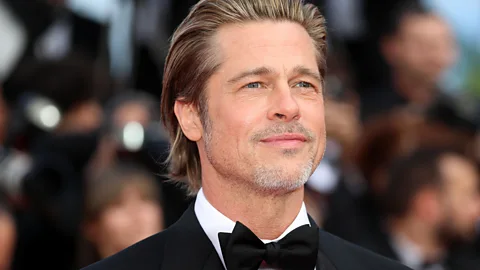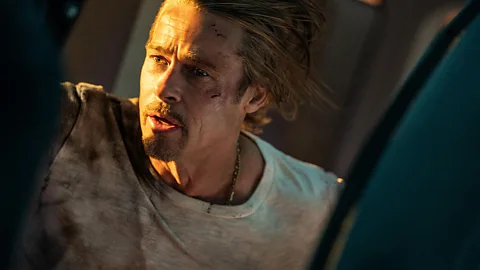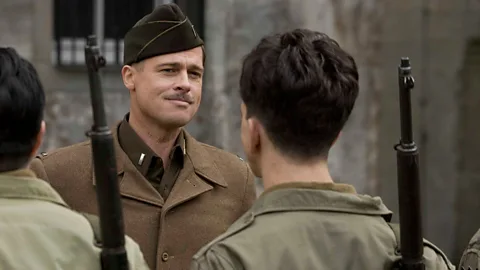Why Brad Pitt is the ultimate film star for the 21st Century
 Getty Images
Getty ImagesIn his latest film Bullet Train, Brad Pitt displays the wry, self-referential humour that has earned him a unique and enduring status in Hollywood, writes Caryn James.
First he was the hunky boy toy in Thelma and Louise, a small role that made viewers wonder, "Who is he?" back in 1991. Then he was the heartthrob younger brother of lookalike Robert Redford's off-screen narrator in A River Runs Through It (1992). He famously became half of Brad and Jen while married to Jennifer Aniston, then half of the tabloids-can't-get-enough-of-them "Brangelina" during his years with Angelina Jolie. All the while, his looks and his marriages may have overshadowed something else. Brad Pitt has built a body of work that most actors only dream of. With performances that range over multiple genres and three decades, and a savvy public relations strategy, his is a model of how to manage a movie-star career.
More like this:
His new action-comedy Bullet Train says a lot about that career. Pitt plays a character as goofy as his code name, Ladybug, a hitman in an unflattering bucket hat. Between fending off assassins on a high-speed Japanese train and trying to steal a briefcase full of cash, Ladybug is trying to become a calmer guy, sincerely spouting self-help lines. "Let this be lesson in the toxicity of anger," Pitt says with deadpan precision after one violent encounter. Bullet Train is an action extravaganza, but the movie's distinguishing feature is its sardonic tone, shaped and carried by its star's performance. Watching it, you could almost make the case that Pitt is a very good dramatic actor, but even better at comedy.
 Sony Pictures
Sony PicturesHis true strength is more complicated than holding up masks of comedy or tragedy, though. Pitt's best performances are the kind that won him his Oscar as the stuntman Cliff Booth in Once Upon a Time in… Hollywood (2019): drama infused with dry humour. As Cliff, his smile is a kind of smirk, but mischievous, not off-putting. As Aldo Raine, the Nazi-scalper with a plummy country accent in Inglourious Basterds (2009), Pitt brought a whiff of humour and absurdity to the film's life-or-death theme. That serious-but-droll combination is his sweet spot, and it works beyond those two Quentin Tarantino films. It's in underappreciated roles, like the hitman (yes, another one) in Andrew Dominick's Killing Them Softly (2012). It's in the ease he brought to a stressed-out baseball general manager in Bennett Miller's Moneyball (2011).
Pitt didn't find that sweet spot right away. He gave powerful and respected dramatic performances almost from the start of his career. He defied his pretty-boy looks as a patient in a psychiatric hospital in the time-travelling 12 Monkeys (1995) and as the pummelled alter ego in Fight Club (1999). His flat-out comedies are rare, but they exist. He sails hilariously through Joel and Ethan Coen's Burn After Reading (2008) as a gum-chomping, bike-riding, none-too-bright trainer in a gym. But nothing could really compete with his golden looks. He got an Oscar nomination for 12 Monkeys, released the same year he was People magazine's Sexiest Man Alive. We know which image stuck.
The turning point was Inglourious Basterds. That's where the sardonic smirk first took hold, where the accent and the crude army-issued haircut helped him escape the shadow of pretty-Brad. Tarantino's screenplay set the character up, but Pitt ran away with it, carrying that mix of drama and wit into other films.
 Universal Pictures
Universal PicturesIt was a clever career turn, different from the paths of most major stars of his generation and stature. George Clooney, 61, hasn't given up acting but has increasingly turned to producing and directing socially conscious films. Tom Cruise, 60, clings to his action past, with this year's Top Gun: Maverick and an apparently endless string of Mission Impossibles, turning a static image into box-office hits. Matt Damon, 51, has gone from Jason Bourne to earnest dad in films like Stillwater (2021). But Pitt, 58, has picked roles that are all over the place. In the last decade or so he has appeared in World War Two dramas and contemporary satires and chosen some sly cameos. That range is part of a canny formula. With no single on-screen persona apart from looking like Brad Pitt, he can avoid being typecast or becoming stale.
Finding the sweet spot
In recent years he has come to mock the pretty-boy image without turning his back on it, a disarming tactic. Showing up in Bullet Train with the silly hat and big nerdy glasses, as if he isn't one of the world's best-looking faces, is a strategy he has put to good use before. In his scene-stealing cameo in this year's adventure rom-com Lost City, he plays a fixer who arrives on the island Sandra Bullock's kidnapped character has been taken to. Her first words to him are a stunned, "Why are you so handsome">window._taboola = window._taboola || []; _taboola.push({ mode: 'alternating-thumbnails-a', container: 'taboola-below-article', placement: 'Below Article', target_type: 'mix' });
